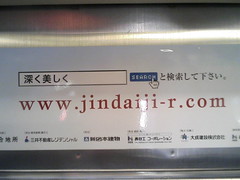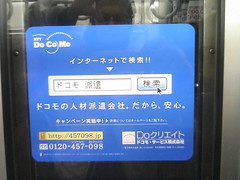Search box mock-ups in Japanese advertising
 As of lately, a lot of Japanese train and TV ads feature a mocked up web search box, suggesting the keyword you should use for getting to the site of the vendor in question, without having to remember its (often awkward) non-Japanese URL — an interesting evolution and in no time more widespread than QR codes (or so it seems).
As of lately, a lot of Japanese train and TV ads feature a mocked up web search box, suggesting the keyword you should use for getting to the site of the vendor in question, without having to remember its (often awkward) non-Japanese URL — an interesting evolution and in no time more widespread than QR codes (or so it seems).
Although a search term is easier to remember than a URL, there is of course a certain risk that users end up on a different website than the one intended. So, I decided to have a quick look at the SE strategies of three randomly chosen ventures that use web search box suggestions in their train ads.
The first example is Jindaiji Residence, a real estate company. In its ad (pictured above), it surprisingly suggests searching for 深く美しく, which stands for "deep, beautiful" and is probably a word play around the "jin" in Jindaiji. If you search for 深く美しく, something interesting happens: both the Google and Yahoo! pages sport a full-width Jindaiji Residence sponsored ad on top (with Yahoo! also displaying the Jindaiji Residence site as the 3rd result). And, because lots of people will get the order of the words wrong, the same ad is served for a 美しく深く ("beautiful, deep") search.
Example two is Tokyo Star Bank, which suggest you search for its loans offering with the search term バンクベスト ("Bank Best"). Not too great search results on Google nor Yahoo!, but also here adwords come to the rescue: the バンクベスト search term triggers display of sidebar and top ads.
 A third example is Docomo's human resources ad, which consists of nothing more than... a search box pointing to ドコモ 派遣 ("Docomo staffing"). If you try this with Yahoo! and Google, the Docomo Staff site shows up as the first result. On Yahoo! you have to skip over a number of unrelated ads though, while on Google a wide Docomo Staff ad is displayed on top.
A third example is Docomo's human resources ad, which consists of nothing more than... a search box pointing to ドコモ 派遣 ("Docomo staffing"). If you try this with Yahoo! and Google, the Docomo Staff site shows up as the first result. On Yahoo! you have to skip over a number of unrelated ads though, while on Google a wide Docomo Staff ad is displayed on top.
So, to summarize: Japanese companies promote specific search terms in trains and on TV, and register those terms as the adwords that trigger their ads. If lots of potential Japanese customers try these search term suggestions, I can imagine the search box mock-up phenomenon is a huge cash cow for Yahoo! and Google.

7 Comments:
In the case of Docomo Staff, although it is indeed the first un-sponsored search result on both Google and Yahoo, I see sponsored ads listed above it (in the blue box) for competitors. I guess this is downside to this advertising strategy - your competitors can also register to use the same keywords (provided they are generic enough).
I think part of the thinking behind this is that more users than you would expect (especially older ones) don't really get the address bar at all, or sometimes confuse it with the search box on their home page (whether that be Yahoo!, MSN, etc.).
You've done well to point out some risks I hadn't thought of, but the good thing is that it only has to work for the life of the ad, in most cases 1 week to 1 month. That is probably short enough to control the territory of a few keywords.
Good write-up! I was never really tempted to try these searches, and thought they must be a SEO nightmare. But that's right, Adwords and Overture are all what's needed!
It really annoys me that they often don't show the URL on the ad.
Also it's often not obvious whether they're advertising a PC or keitai site (though this is another matter). :)
Yep, great write-up. However, it is still hard to remember those search terms and so the problem is far from solved.
But, it's less awkward than waving your keitai around trying to get your camera to focus properly on the tiny (and often distant) QR-code.
This Jan 2007 survey shows that in one year, the % of people having seen a TV ad asking viewers to search for a Keyword (instead of a URL) has increased by 10% to 61% of the respondents. It also shows that more than 30% have at least once gone on to search for it in a search engine.
I noticed a variation of this in an English-language magazine. It was an ad for a Japanese company called Yaskawa, and at the top of the ad it says "Wikipedia: Mechatronics". I thought that was a pretty odd business decision, since people can generally change Wikipedia pages at will -- not just outright vandalism, but competitors adding their own spin, etc.; and Wikipedia itself might not be too keen on being used for advertising.
I created www.telldodo.com to serve exactly this purpose: replace URLs with easy to remember, easy to pronounce, easy to spell UNIQUE keywords. Perhaps I should hook up with someone in Japan to create a Japanese version of telldodo. Let me know if you have an interest in developing this idea...
Post a Comment
Links to this entry:
Track with Technorati
Track with Google Blog Search
<< Home